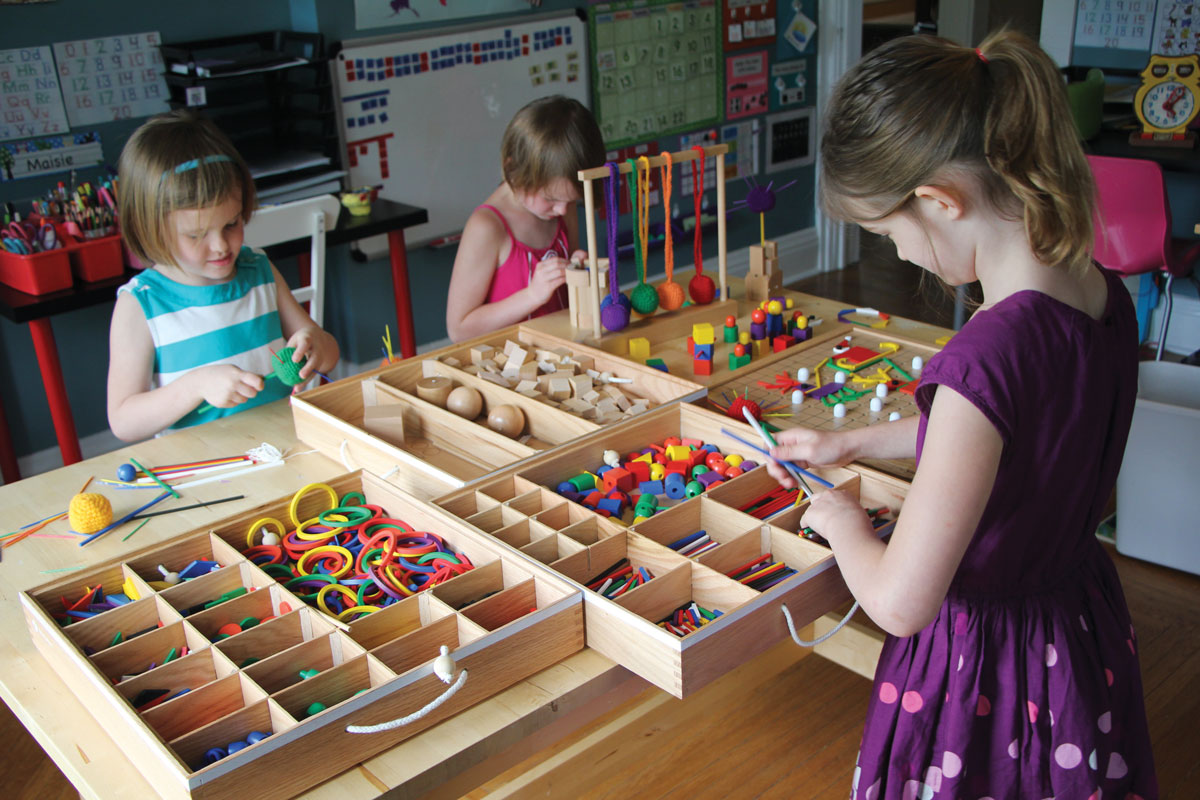"Just" Play: Work, Play and the Educator's Dilemma
Published: April 13, 2021

Children bustle about a brightly lit and colorful classroom filled with wooden blocks, pegboards and trays brimming with beads, shapes and rings. Deeply absorbed in activity, they engage the objects, environment and buddies. Missing is the stark silence that fills many classrooms across our country; missing too are the independent desks and pages of standardized, multiple choice questions that come to mind when we picture children deep at work.
Still, this Montessori classroom hums with the exchange of ideas, frustrations and solutions. Are these children deep at work as well, or are they simply playing?
We educators love to categorize and label activities. It gives us comfort to distinguish our day as productive, so we use terms such as "classwork," "workstation" and "worksheets." Creating a product at the end of a long day gives us a sense of accomplishment. However, unlike a farm, learning does not always produce a tangible vegetable that verifies we did not waste our day on frivolous activities. Cognition and learning are abstract. They often leave us without some "thing" that we can point to with satisfaction.
In our desperation to produce a product, we sometimes label learning with an A+ to show mastery. We ignore that the letter grade symbol is yet another abstract concept, and we treat it like a product that proves we "worked" and did not "just" play. However, grades are not real products.
We also sometimes attempt to define our productivity through our means, that is, our work. Whether that definition comes from our Protestant work ethic or our agricultural roots, it generally goes something like this: "Work is obligatory, sober, serious and not fun, and play is the opposite of these" (Smith, 1997, p. 207). We cling to this definition and assume that learning must also be obligatory, sober, serious and not fun. Learning is not and has never been that simple.
Our great educational theorists Dewey, Froebel, Malaguzzi, Piaget, Vygotsky and Montessori all largely criticized this dichotomy of work OR play. They particularly criticized the notion that the experience of work, not play, leads to learning. Educational theory, then and today, incorporates student-directed natural play activities as the work of the student.
Stuart Brown, a pioneer in play research, observes that work and play are not poles apart. "In both we are building our world, creating new relationships, neural connections, objects," he writes. "Even demolition or sand castle smashing is a kind of creativity, since they clear the landscape, opening the way for new buildings."
Work may provide products but play provides a way for us to reconstruct our experiences and gain meaning from our work. When we explore and find meaning in the world around us through play, we learn. When we sit in cold hard plastic chairs, silently listening to a lady in a skirt or a man in a tie articulate a concept so we can receive our A, it is obligatory, sober, serious and not fun. The assumption that it is productive is certainly in question.
Play is critical to learning; in fact the work of the student is play. As Maria Montessori expressed, "Such experience is not just [a child's] play . . . it is work he must do in order to grow up."
As children, we played with wooden blocks to learn; as adult learners, we play with paint, technology, words, numbers, scientific processes and prayer. Our play may not produce a tangible product, but it is often our avenue to discover fresh ideas, create original works and understand our God and His creation in new and meaningful ways.
Instructors in the education department at Greenville College are devoted to guiding students to a deep understanding of how people learn, so we invite them to play with children. Each year they attend City Garden Montessori School, which is founded upon and committed to play in the classroom. As GC students engage with City Garden's children, they build a conceptual framework about how the human brain learns. They discover the wonder and meaning of play in a way they might never achieve through "obligatory, sober, serious and not fun" ways.
Within the context of learning, work is important, but play is what makes our work meaningful.
Related ArticlesA Montessori Guide's Passion for Play
Math Wizards: GC Students Tutor East St. Louis Students
Allaman Honored as Lincoln Laureate
